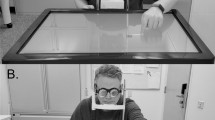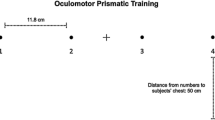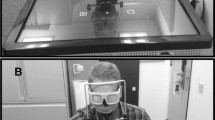Abstract.
The errors in target-reaching that are produced by laterally displacing vision with wedge prisms decrease with trials (prism adaptation). When the prisms are removed, errors in the opposite direction are observed (aftereffect). We investigated the size of the aftereffect 24 h and 72 h after a monkey had adapted to a visual displacement (30 mm), with rapid reaching movements. The aftereffect more than half of the size of the displacement was observed when the effect was tested immediately after the monkey had been exposed to the displacement for 50 trials. In contrast, the aftereffect was not observed at 24 h even when the monkey had been exposed to the displacement for 250 trials. However, when the monkey had been exposed for 500 trials, significant aftereffects more than half of the size of the displacement were observed at 24 h and 72 h. When both arms were adapted to opposite prism displacements, the long-lasting aftereffect was further shown to be specific for the arm used during the exposure. The results indicate that the aftereffects of prism adaptation last for at least 3 days, though more than 200 trials of additional repetition are required to consolidate the short-term effects into long-lasting ones.
Similar content being viewed by others
Author information
Authors and Affiliations
Additional information
Electronic Publication
Rights and permissions
About this article
Cite this article
Yin, PB., Kitazawa, S. Long-lasting aftereffects of prism adaptation in the monkey. Exp Brain Res 141, 250–253 (2001). https://doi.org/10.1007/s002210100892
Received:
Accepted:
Issue Date:
DOI: https://doi.org/10.1007/s002210100892




